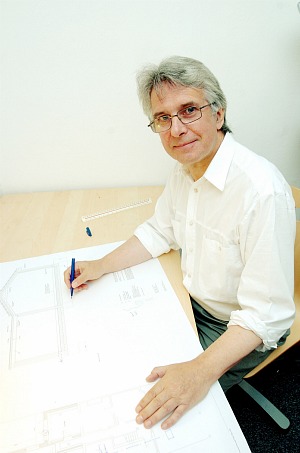How do you describe your job when you meet people at a party?
Architect. (There is always the possibility of picking up work!) If I say I am a maths teacher people start looking anxious!
What is ‘cutting-edge’ about your work?
I am hoping my research is. I am looking to see if I can use linear fractional transformations to generate building plans. LTRs work on the complex plane and have been used to generate fractal patterns and map the surface of the brain
What are the biggest implications your work will/could have in the future?
If a “mathematics of building plans” can be found then layouts can more easily be optimized against certain criteria and perhaps more interesting configurations found
Describe some of the highlights of your average day.
As an architect, there’s nothing better than going around a finished project and seeing how pleased people are. One minute the place is looking an absolute tip, but when it’s finished people can see it as you’ve seen it and everyone’s pleased. In teaching, it’s when you’re with a student and the penny drops. Suddenly they get it and say “I know what you’re talking about now.”
Describe briefly how your career has progressed to date.
I started by studying architecture at school – which was considered a science. Most people went into engineering, some into pure science, but if you had a bit of imagination you went into architecture and design. Very few people went into mathematics – it was deemed for the very clever only. Architecture was considered more like a social science – we were going to use it to solve social problems. Every so often there’s a recession and there’s no work as an architect. A lot of people try to rebrand/reinvent themselves when there’s only a certain amount of work around. So I decided to study mathematics. It took me two recessions. I started in the 80s by doing one course, and then in the 90s I finished it off. I thought I’d try to apply for a job in a data gathering center. But as a material person, maths is not the sort of thing that mature students succeed in….you need to be young to think about a career. So I went into teaching. I split myself between the two careers…architecture and maths teaching
How is your job cross-disciplinary?
As a practicing architect you use basic maths every day, but nothing profound. As a teacher you use a lot of imagination, which architects are used to using. There is an overlap of function. The more maths you understand the more you can use in the design of buildings, but not in a profound way. I’m trying to do some research on the links between the two. For example, I’m looking at complex mathematics and the mathematics of imaginary numbers (fractal patterns, interesting imaginative shapes). I’m interested in using that to design building plans. I’m tinkering with the idea and have made proposals to a conference. I’ve presented an article in the Nexus Network journal, which looks at the links between mathematics and architecture and I had a poster at a Maths conference (European Consortium for Industrial Mathematics). It’s funny because once you’re out on a limb yourself, the ideas could be useful but you never really know for sure
How do you see your field developing over the next 5-10 years?
Both architecture and teaching are under threat. With teaching, I wonder if at some stage in the future they’ll say “do you remember when people had individual teachers?” Everything may move to computers. With architecture, all you have to do is look at all the programmes on telly about people having a go designing something themselves…that’s becoming more and more common. You could come back in 500 years and see that the word architect doesn’t mean much anymore. And teaching could be very different too. But you never know – perhaps people will reject the computer and demand a real person
What’s the most unexpected thing about your job?
About teaching, the most surprising thing is when it’s so clear in my mind, but not in my students’. That constantly surprises me. It becomes a challenge. I’ve explained something all the ways I can but it still doesn’t sink in. In architecture, the strange thing is how we’re dominated by words. People like things explained in English. People, when confronted with a drawing, don’t always understand it. They say that looks good, but they’re commenting on its superficial qualities. Its only when things start to get built that they question it. They don’t see drawings as a proper means of communication. In construction planning, people tend to want descriptions in words. You’re putting everything in a drawing into words for them…and you think, “What’s the point? It’s all there in the drawing.” They see the narrative as a higher form of communication.
What’s the biggest achievement of your career so far?
Successfully managing a career in both architecture and teaching, and being able to merge the two

